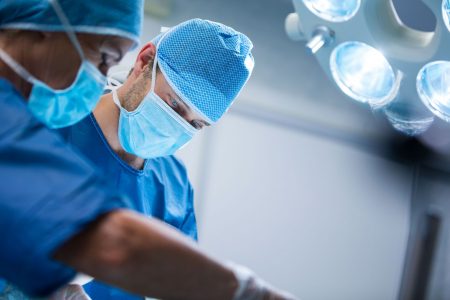Development Focus
Acute Radiation Syndrome

Radiation sickness, or acute radiation syndrome (ARS), is a serious illness that occurs after individuals have been exposed to high levels of ionizing radiation already for a short period of time. A nuclear disaster, accident near a nuclear power plant, or act of terrorism such as a “dirty bomb“ can be primary causes.
The detrimental impact of ionizing radiation is wide-ranging and encompasses both whole body and organ-specific damage. ARS typically includes a range of physical signs and symptoms that reflect severe damage to specific parts of the body, including the bone marrow and blood (H-ARS), the gastrointestinal tract (GI-ARS), the neurovascular systems (NV-ARS), and the skin (C-ARS).
ARS represents an attractive, sizeable, but highly underserved market. Despite the continuous threat of nuclear warfare as well as civilian nuclear incidents, options for medical countermeasures (MCMs) are virtually non-existent. US and EU strategic national stockpile programs hence have urgent unmet need to source new effective MCMs.
Radiation sickness, or acute radiation syndrome (ARS), is a serious illness that occurs after individuals have been exposed to high levels of ionizing radiation already for a short period of time. A nuclear disaster, accident near a nuclear power plant, or act of terrorism such as a “dirty bomb“ can be primary causes.
The detrimental impact of ionizing radiation is wide-ranging and encompasses both whole body and organ-specific damage. ARS typically includes a range of physical signs and symptoms that reflect severe damage to specific parts of the body, including the bone marrow and blood (H-ARS), the gastrointestinal tract (GI-ARS), the neurovascular systems (NV-ARS), and the skin (C-ARS).
ARS represents an attractive, sizeable, but highly underserved market. Despite the continuous threat of nuclear warfare as well as civilian nuclear incidents, options for medical countermeasures (MCMs) are virtually non-existent. US and EU strategic national stockpile programs hence have urgent unmet need to source new effective MCMs.

Pregnancy Related Diagnostics – In-Vitro Fertilisation

In-Vitro Fertilization (IVF) is a technology that introduces the female egg and male sperm together in a specialized culture medium where the chances of successful fertilization are greatly enhanced. The embryos are observed and grown for reintroduction to the recipient’s uterus at a multicell embryo stage or later at the blastocyst embryo stage.
Undergoing an IVF often is an emotional process often accompanied by repeat disappointment and high cost. The market is commercially attractive for a diagnostic tool that can enhance success rates of the procedure by preselecting only viable embryos for implantation.
Transplant

Transplantation is a procedure by which organs or cells are removed from one body and placed into another, to replace damaged or missing equivalents. The procedure is often life saving. However, transplants have high complication rates, short- as well as long-term rejections occur frequently, and many patients in need of a transplant do not find an appropriate donor.
Tremendous commercial potential exists for a therapeutic agent that can enable transplantation, enhance acceptance, improve viability, and/ or improve patient outcomes.
Transplantation is a procedure by which organs or cells are removed from one body and placed into another, to replace damaged or missing equivalents. The procedure is often life saving. However, transplants have high complication rates, short- as well as long-term rejections occur frequently, and many patients in need of a transplant do not find an appropriate donor.
Tremendous commercial potential exists for a therapeutic agent that can enable transplantation, enhance acceptance, improve viability, and/ or improve patient outcomes.

